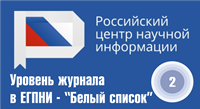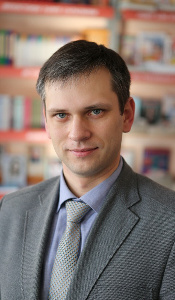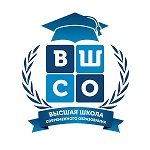МЕТОД «ПЕРЕВЕРНУТЫЙ КЛАСС» НА ЗАНЯТИЯХ ПО ИНОСТРАННОМУ ЯЗЫКУ В ВУЗЕ (АЛГОРИТМ РАБОТЫ)
Аннотация
Актуальность: сейчас в условиях растущей конкуренции на рынке труда необходимы новые подходы к иноязычному образованию. Актуальная задача реализации образовательных программ специалитета – это подготовка специалистов способных к профессиональной деятельности. Согласно ФГОС ВО по специальности 38.05.01 Экономическая безопасность, одним из результатов обучения является – «способность осуществлять деловую коммуникацию в устной и письменной формах на иностранном языке», то есть иноязычная коммуникация – важный компонент для успешной профессиональной деятельности специалиста. Наблюдается противоречие между требованием ФГОС ВО и актуальным уровнем развития общеобразовательной компетенции у обучающихся в вузе, что делает данную работу актуальной. Задача педагога - организация учебного процесса так, чтобы деятельность обучающихся являлась успешной, а знания востребованными. Для решения данной задачи можно применить метод «Перевернутый класс», поэтому видится необходимость в разработке алгоритма работы участников образовательного процесса при применении этого метода.
Основная цель – разработка алгоритма действий педагога и обучающегося на занятиях по иностранному языку в вузе при применении метода «Перевернутый класс».
Методы исследования: общенаучные (анализ, синтез, дедукция) и частно-научные (тестирование, наблюдение, анкетирование).
Результаты. В работе предлагаются условия применения изучаемого метода на занятиях по иностранному языку и алгоритмы действий преподавателя и обучающихся на разных этапах его внедрения.
Заключение. Описание алгоритмов применения метода «Перевернутый класс» в образовательном процессе может быть использовано педагогами и методистами; алгоритмы могут быть применимы при обучении иностранному языку обучающихся специалитета в вузе.
Скачивания
Литература
Список литературы
Анюшенкова О.Н. Преимущества «Перевёрнутого класса» перед традиционной (очной) методикой преподавания иностранного языка в контексте высшего образования // Теория и практика обучения ин. языкам в неязыковом вузе: традиции, инновации, перспективы. 2017. С. 16–20.
Белашевская Н.А. Модель «Перевёрнутый класс» как один из компонентов современной технологии обучения иностранным языкам // Эмиховские чтения: Материалы V международной научно-практической конференции (Тюмень, 15-17 ноября 2017 года). 2018. С. 27-32.
Болгова, В. В. Использование инновационной технологии «Перевёрнутый класс» как компонента ФГОС на уроках английского языка // Наука и образование: Новое Время. Науч.-мет. ж-л. 2017. № 5 (6). С. 86–90.
Вербицкий А.А. Методика, метод, педагогическая технология // Педагогическое образование: Вызовы XXI века. 2017. С. 169–173.
Воронина М.В. «Перевёрнутый» класс – инновационная модель обучения // Открытое образование. 2018. Т. 22, № 5. С. 40–52.
Гладких Д.С. Использование технологии Flipped Classroom при обучении иноязычной письменной речи в старшей школе // Проблемы романо-германской филологии, педагогики и методики преподавания иностранных языков. 2018. № 14. С. 118–123.
Даниленко А. С. Структура иноязычной коммуникативной компетенции // Вестник Красноярского государственного педагогического университета им. В. П. Астафьева. 2016. № 1 (35). С. 187–189.
Троянская С.Л. Основы компетентностного подхода в высшем образовании: учебное пособие. Ижевск: Издательский центр «Удмуртский университет», 2016. 176 с.
Мильруд Р.П. Компетентность в языковом образовании // Вестник тамбовского университета. С.: гуманитарные науки. 2003. № 2 (30). С. 100–106.
Мишенева Ю.И. Компетентностный подход в обучении иностранным языкам // Научно-методический электронный журнал Концепт. 2014. № S8. С. 31–35.
Мельникова О.К., Благовещенская А.А. Применение метода «Перевёрнутого класса» в преподавании английского языка в ВУЗе // Успехи современной науки. 2017. С. 96–99.
Чичиланова С.А., Нестерова С.А. Особенности технологии «Перевёрнутый класс» в процессе обучения иностранного языка // Гуманизация образования. 2018. №3. С. 104–108.
Alqarni, A. Blended Learning and Flipped Classroom Approaches // American Research Journal of Humanities and Social Sciences. 2018. Vol. 4. №1. P. 1-6. https://www.arjonline.org/papers/arjhss/v4-i1/12.pdf
Mohan D. Flipped Classroom, Flipped Teaching and Flipped Learning in the Foreign/Second Language Post–Secondary Classroom // Second Language Pedagogies: From Theory to Practice. 2018. Vol. II. №11. Р. 22-25. https://journal.lib.uoguelph.ca/index.php/nrsc/article/view/4016
Nouri J. The flipped classroom: for active, effective and increased learning – especially for low achievers // Int J Educ Technol High Educ. 2016. №13, 33. https://doi.org/10.1186/s41239-016-0032-z
Tazijan F. N. Building Communication skills through Flipped Classroom // International Academic Research Journal of Social Science. № 3(1). 2017. P. 142-147. https://www.researchgate.net/publication/320919865_Building_Communication_Skilled_through_Flipped_Classroom
Strayer J. F. How Learning in an Inverted Classroom Influences Cooperation, Innovation and Task Orientation // Learning Environments Research, 2012. №15(2). P. 171-193. https://link.springer.com/article/10.1007%2Fs10984-012-9108-4
References
Anyushenkova O. N. Preimushchestva «Perevyornutogo klassa» pered tradicionnoj (ochnoj) metodikoj prepodavaniya inostrannogo yazyka v kontekste vysshego obrazovaniya [Advantages of the “Flipped classroom” over the traditional (full-time) methodology of teaching a foreign language in the context of higher education]. Teoriya i praktika obucheniya inostrannym yazykam v neyazykovom vuze: tradicii, innovacii, perspektivy [Theory and practice of teaching foreign languages in a non-linguistic university: traditions, innovations, prospects]. 2017, pp. 16-20.
Belashevskaja, N. A. Model’ «Perevjornutyj klass» kak odin iz komponentov sovremennoj tehnologii obuchenija inostrannym jazykam [The Flipped Class model as one of the components of modern foreign language learning technology]. Jemihovskie chtenija : Materialy V mezhdunarodnoj nauchno-prakticheskoj konferencii (Tjumen’, 15-17 nojabrja 2017 goda) [Emikhovsky readings: Proceedings of the V International Scientific and Practical Conference (Tyumen, November 15-17, 2017)], 2018, pp. 27-32.
Bolgova, V. V. Ispol’zovanie innovacionnoj tekhnologii «Perevyornutyj klass» kak komponenta FGOS na urokah anglijskogo yazyka [The use of innovative technology “ Flipped classroom” as a component of the Federal State Educational Standard in English lessons]. Nauka i obrazovanie: Novoe Vremya. Nauchno-metodicheskij zhurnal, 2017, no. 5 (6), pp. 86-90.
Verbickij A.A. Metodika, metod, pedagogicheskaya tekhnologiya [Methodology, method, pedagogical technology]. Pedagogicheskoe obrazovanie: Vyzovy XXI veka [Teacher Education: Challenges of the 21st Century], 2017, pp. 169-173.
Voronina M. V. «Perevyornutyj» klass – innovacionnaya model’ obucheniya [The “Flipped” classroom is an innovative learning model]. Otkrytoe obrazovanie, 2018, vol. 22, no. 5, pp. 40-52.
Gladkih D.S. Ispol’zovanie tekhnologii Flipped Classroom pri obuchenii inoyazychnoj pis’mennoj rechi v starshej shkole [The use of Flipped Classroom technology in teaching foreign language writing in high school]. Problemy romano-germanskoj filologii, pedagogiki i metodiki prepodavaniya inostrannyh yazykov, 2018, no. 14, pp. 118-123.
Danilenko A.S. Struktura inoyazychnoj kommunikativnoj kompetencii [Structure of foreign language communicative competence]. Vestnik Krasnoyarskogo gosudarstvennogo pedagogicheskogo universiteta im. V. P. Astaf’eva, 2016, no. 1 (35), pp. 187-189.
Troyanskaya S.L. Osnovy kompetentnostnogo podhoda v vysshem obrazovanii [Fundamentals of the competence approach in higher education]. Izhevsk: Izdatel’skij centr «Udmurtskij universitet», 2016, 176 p.
Mil’rud R.P. Kompetentnost’ v yazykovom obrazovanii [Competence in language education]. Vestnik tambovskogo universiteta. Seriya: gumanitarnye nauki, 2003, no. 2 (30), pp. 100-106.
Misheneva YU.I. Kompetentnostnyj podhod v obuchenii inostrannym yazykam [Competence-based approach in teaching foreign languages]. Koncept, 2014, no. S8, pp. 31-35.
Mel’nikova O.K., Blagoveshchenskaya A.A. Primenenie metoda «Perevyornutogo klassa» v prepodavanii anglijskogo yazyka v VUZe [Application of the “ Flipped Class” method in teaching English at a university]. Uspekhi sovremennoj nauki, 2017, pp. 96-99.
Chichilanova S.A., Nesterova S.A. Osobennosti tekhnologii «Perevyornutyj klass» v processe obucheniya inostrannogo yazyka [Features of the “Flipped classroom” technology in the process of learning a foreign language]. Gumanizaciya obrazovaniya, 2018, no. 3, pp. 104-108.
Alqarni, A. Blended Learning and Flipped Classroom Approaches. American Research Journal of Humanities and Social Sciences, 2018, vol. 4, no. 1, pp. 1-6. https://www.arjonline.org/papers/arjhss/v4-i1/12.pdf
Mohan, D. Flipped Classroom, Flipped Teaching and Flipped Learning in the Foreign/Second Language Post–Secondary Classroom. Second Language Pedagogies: From Theory to Practice, 2018, vol. II, no. 11, pp. 22-25. https://journal.lib.uoguelph.ca/index.php/nrsc/article/view/4016
Nouri, J. The flipped classroom: for active, effective and increased learning – especially for low achievers. Int J Educ Technol High Educ., 2016, no. 13, 33. https://doi.org/10.1186/s41239-016-0032-z
Tazijan, F. N. Building Communication skills through Flipped Classroom. International Academic Research Journal of Social Science, 2017, no. 3(1), pp. 142-147. https://www.researchgate.net/publication/320919865_Building_Communication_Skilled_through_Flipped_Classroom
Strayer J. F. How Learning in an Inverted Classroom Influences Cooperation, Innovation and Task Orientation. Learning Environments Research, 2012, no. 15(2), pp. 171-193. https://link.springer.com/article/10.1007%2Fs10984-012-9108-4
Просмотров аннотации: 237
Copyright (c) 2022 Lionella N. Lubozheva

Это произведение доступно по лицензии Creative Commons «Attribution-NonCommercial-NoDerivatives» («Атрибуция — Некоммерческое использование — Без производных произведений») 4.0 Всемирная.





































